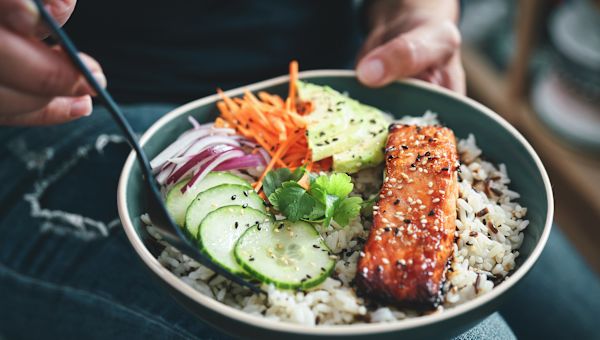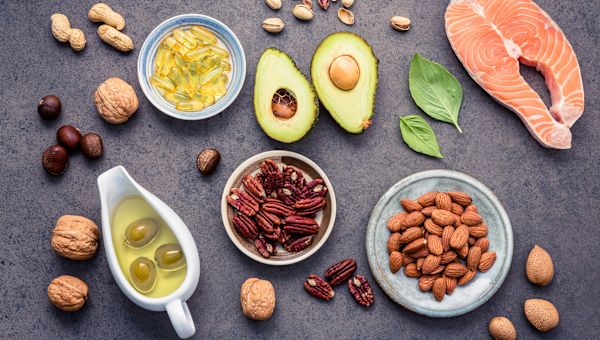Avoiding fat? 7 reasons you shouldn't
Eating the right kind of dietary fat can help you boost your memory, lower your cholesterol levels, and so much more.
Updated on January 30, 2026

In the wake of trendy diets that promote eating little to no fat, this essential nutrient has gotten a bad reputation. But not all dietary fats are created equal. There are unhealthy kinds that should be limited or avoided altogether and healthy kinds that deserve a place at the dinner table. Our bodies rely on healthy fats to function well. Knowing which to choose can make a big difference in your overall well-being.
Saturated fats found in foods like beef, pork, and coconut oil are linked to high cholesterol, stroke, and heart disease. Trans fats have largely been phased out of food products in the United States, but they can still be found in certain processed and packaged foods like pastries, fried foods made with partially hydrogenated oils, and some frozen meals. Trans fats can raise levels of low-density lipoprotein (LDL, aka “bad” cholesterol), lower levels of high-density lipoprotein (HDL, aka “good” cholesterol), and increase your risk for type 2 diabetes.
What you want in your diet instead are unsaturated fats and omega-3 fatty acids, found primarily in plant products like nuts, olives and seeds, and in fish such as salmon. Both polyunsaturated fats (like omega-3 fatty acids) and monounsaturated fats help lower cholesterol levels and boost heart health. Read on for more good reasons to eat healthy fats.

Healthy fats help manage cholesterol
Heart disease is the leading cause of death among adults in the U.S., resulting in about 700,000 reported deaths each year. High levels of LDL cholesterol are a leading risk factor for heart disease, while high levels of HDL cholesterol are linked to a lower risk. Cholesterol levels are affected by several factors, including diet, weight, physical activity level, age, sex, and family history. Some factors are beyond your control, but many can be modified to help lower your heart disease risk.
A diet rich in saturated fats has been tied to higher levels of LDL. Research suggests that replacing saturated fats with unsaturated fats can help lower your risk of heart disaese partly by lowering LDL and increasing HDL levels. And it's not as hard as you think. Try replacing one serving of red meat each week with a piece of fatty fish, like salmon, tuna, trout, or herring.
“This helps lower the overall risk of heart disease and stroke,” says Frank Chae, MD, a bariatric surgeon with Sky Ridge Medical Center in Lone Tree, Colorado.

Unsaturated fats regulate hormones
Hormones are chemicals that work to aid various body functions and processes, from growth to sexual function to mood. These chemicals can be affected by age, stress, medical conditions, and even your diet.
When your hormones are imbalanced, your body doesn’t function the way it should. Too much or too little fat in your diet could affect your hormone levels.
The typical Western diet, which tends to be high in saturated fat, may contribute to higher-than-normal levels of estrogen—the primary female sex hormone. Some research suggests the Western diet may be linked to an increased risk of breast cancer.
For men, low-fat diets can negatively affect testosterone levels. Testosterone is the hormone responsible for male sex drive and physical characteristics, like bone and muscle mass.
What’s the right amount of fat? The American Heart Association recommends limiting your intake of saturated fats to less than 10 percent of daily calories. Whenever possible, try to replace saturated fats like butter with healthier unsaturated fats like olive oil whenever possible.

Fat keeps you fuller, longer
When eaten in small portions, healthy fats may help you slim down because they keep you feeling fuller for longer.
If you’re looking to sate hunger, try snacking on a handful of nuts, like almonds or walnuts. Stick to one serving, which translates to about 23 almonds or 13 walnut halves.
Dr. Chae stresses the importance of moderation when it comes to eating foods high in fat. High-fat foods, even those containing healthy fats, are dense with calories.

Monounsaturated fat slows atherosclerosis
Atherosclerosis, characterized by the buildup of fatty plaque in the arteries, can result in heart, kidney, or peripheral artery disease. People who smoke, those with high cholesterol, or who have high blood pressure are at an elevated risk of developing atherosclerosis. Addressing those health problems can lower your risk.
Foods high in omega-3s and monounsaturated fats—like avocados, walnuts, macadamia nuts, pecans, and canola oil—can help lower cholesterol levels and decrease rates of heart disease.

Healthy fats boost vitamin absorption
People need a wide variety of vitamins and minerals to function properly. When our bodies can’t make these on their own, we can get them through foods and dietary supplements.
But there’s more to getting some vitamins, like vitamins A, D, E, and K, than simply eating vitamin-rich foods. These are a fat-soluble vitamins, which means the body needs dietary fat to absorb them efficiently. For example, research shows that vitamin E is better absorbed when taken with a high-fat meal compared with a lower-fat meal. Because vitamin E is important for a healthy immune system, an inability to absorb the vitamin can lead to immune problems.

Omega-3 fatty acid may help boost memory
Research suggests that omega-3s, the fatty acids found in fish, can help boost memory and improve cognition. One systematic review of the effects of omega-3 fatty acids on brain function linked their consumption to increases in learning, memory, and cognitive well-being. The review was published in 2022 in the journal Cureus.
The American Heart Association recommends consuming at least two servings of fish each week. The Mediterranean diet, an eating plan endorsed by Chae and many other experts, recommends having two to three servings of fatty fish, like sardines and cod, each week. What else should be a part of your eating plan? “A Mediterranean diet consists of lean protein, with healthy fats, vegetables, fruit, and nuts with monounsaturated fats,” says Chae.

Healthy ways to add fat to your diet
We know our bodies need healthy fats to thrive. Fortunately, there are many flavorful ways to enjoy your daily dose of healthy fats:
- Toss a tablespoon of chopped walnuts into your lunchtime salad. Add a drizzle of olive oil for an extra boost.
- Top your morning eggs with a few slices of ripe avocado.
- Sprinkle a tablespoon of chia seeds on nonfat plain Greek yogurt.
- Spice up your morning with maple walnut flaxseed pancakes.
- Try cooking a simple fish dish, like oven-roasted salmon recipe.
- Blend chia or hemp seeds into your favorite smoothie.

Danielle Mary Edwards,Peter Ondish,Roni Neff,Increasing meatless options to decrease meat consumption – a quantitative analysis of the relationship between the percentage of meatless items offered on a specials menu and meatless purchases, Food Quality and Preference, 137, (105763), (2026).
MedlinePlus. Facts about saturated fats. May 14, 2024.
MedlinePlus. Facts about polyunsaturated fats. May 14, 2024.
MedlinePlus. Facts about monounsaturated fats. May 14, 2024.
Food and Drug Administration. Trans fat. Accessed August 6, 2022.
Centers for Disease Control and Prevention. Heart Disease: Heart Disease Facts. October 24, 2024.
Harvard TH Chan School of Public Health. Types of Fat. Accessed May 27, 2024.
Whittaker J, Wu K. Low-fat diets and testosterone in men: Systematic review and meta-analysis of intervention studies. J Steroid Biochem Mol Biol. 2021 Jun;210:105878.
Prentice RL, Aragaki AK, et al. Low-Fat Dietary Pattern among Postmenopausal Women Influences Long-Term Cancer, Cardiovascular Disease, and Diabetes Outcomes. J Nutr. 2019 Sep 1;149(9):1565-1574.
Xiao Y, Xia J, et al. Associations between dietary patterns and the risk of breast cancer: a systematic review and meta-analysis of observational studies. Breast Cancer Res. 2019 Jan 29;21(1):16.
Lodi M, Kiehl A, et al. Lipid Intake and Breast Cancer Risk: Is There a Link? A New Focus and Meta-Analysis. Eur J Breast Health. 2022 Apr 1;18(2):108-126. doi: 10.4274/ejbh.galenos.2021.2021-11-2
Guarneiri LL, Paton CM, Cooper JA. Pecan-Enriched Diets Alter Cholesterol Profiles and Triglycerides in Adults at Risk for Cardiovascular Disease in a Randomized, Controlled Trial. J Nutr. 2021 Oct 1;151(10):3091-3101.
National Cancer Institute. Fat-soluble vitamin. Accessed May 27. 2025.
MedlinePlus. Vitamins. January 19, 2023.
Dighriri IM, Alsubaie AM, et al. Effects of Omega-3 Polyunsaturated Fatty Acids on Brain Functions: A Systematic Review. Cureus. 2022 Oct 9;14(10):e30091.
American Heart Association. Fish and Omega-3 Fatty Acids. August 23, 2024.
Harvard Health Blog. A Practical Guide to the Mediterranean Diet. Harvard Health Publishing. March 22, 2023.
Office of Dietary Supplements. Omega-3 Fatty Acids. National Institutes of Health. July 18, 2022.
More On


video

article

slideshow


video


video
